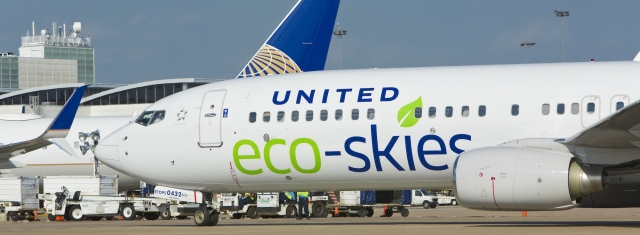Travel
United Airlines: $30 Million investment in Fulcrum Bio Energy
Fulcrum

(Source: Photo by United/Continental Media Room)
USPA NEWS -
Fulcrum, which is backed by Waste Management, converts household trash into renewable jet fuel. Airline has opportunity to purchase at least 90 million gallons of sustainable aviation biofuel a year. Single largest investment by a U.S. airline in alternative fuels.
United Airlines today announced an historic $30 million equity investment in U.S.-based alternative fuels developer Fulcrum BioEnergy, Inc., a pioneer in the development and commercialization of converting municipal solid waste into low-cost sustainable aviation biofuel. It is also the single largest investment by a U.S. airline in alternative fuels and sets United apart in the aviation industry in the advancement of aviation biofuels and carbon emissions reductions. In addition to the equity investment, United and Fulcrum have entered into an agreement that contemplates the joint development of up to five projects located near United's hubs expected to have the potential to produce up to 180 million gallons of fuel per year.
United has also negotiated a long-term supply agreement with Fulcrum and, subject to availability, will have the opportunity to purchase at least 90 million gallons of sustainable aviation fuel a year for a minimum of 10 years at a cost that is competitive with conventional jet fuel. This alternative fuel will be a drop-in fuel that meets all of the airline's technical requirements and specifications, and will power the aircraft in the same way as conventional jet fuel. Fulcrum expects its first alternative fuels plant to begin commercial operation in 2017.
Fulcrum's Waste-to-Biofuel Technology
Fulcrum's technology converts household trash, known as municipal solid waste (MSW), into renewable jet fuel. Fulcrum's renewable jet fuel is expected to provide a greater than 80 percent reduction in lifecycle carbon emissions when compared to conventional jet fuel. Fulcrum has successfully developed and proven its technology to convert MSW into low-cost, low-carbon transportation fuels in an innovative, clean and efficient thermochemical process. MSW is an attractive biofuel feedstock as it is low cost, has limited volatility and a virtually unlimited supply
Fulcrum's technology converts household trash, known as municipal solid waste (MSW), into renewable jet fuel. Fulcrum's renewable jet fuel is expected to provide a greater than 80 percent reduction in lifecycle carbon emissions when compared to conventional jet fuel. Fulcrum has successfully developed and proven its technology to convert MSW into low-cost, low-carbon transportation fuels in an innovative, clean and efficient thermochemical process. MSW is an attractive biofuel feedstock as it is low cost, has limited volatility and a virtually unlimited supply
United's agreement with Fulcrum is expected to decrease the airline's carbon footprint through the use of sustainable aviation biofuel, while also diverting waste from landfills and creating new jobs in those communities where new Fulcrum facilities are sited. Fulcrum's projects have also received support and participation from the U.S. Air Force and U.S. Navy for the future production of fuel that meets military specifications.
United's Track Record in Aviation Biofuels
United is the first U.S. airline to invest in a biofuel company. It is another in a series of firsts for the airline which, since 2009, has made significant investments in the advancement of sustainable aviation biofuels.
“¢ In 2009, United made history as the first North American carrier to perform a two-engine aircraft demonstration flight using sustainable biofuels.
“¢ In 2011, United operated the first U.S. passenger flight powered by advanced biofuels made from algae.
United is the first U.S. airline to invest in a biofuel company. It is another in a series of firsts for the airline which, since 2009, has made significant investments in the advancement of sustainable aviation biofuels.
“¢ In 2009, United made history as the first North American carrier to perform a two-engine aircraft demonstration flight using sustainable biofuels.
“¢ In 2011, United operated the first U.S. passenger flight powered by advanced biofuels made from algae.
“¢ In 2012, United spearheaded the Midwest Aviation Sustainable Biofuel Initiative (MASBI), a public/private partnership of experts from across the Midwest Region, to accelerate the commercialization of advanced biofuels for aviation.
“¢ In 2013, United announced an agreement with AltAir Fuels for advanced aviation biofuels to be used on flights out of the airline's Los Angeles hub, making it the first U.S. carrier to execute a commercial scale agreement for aviation biofuels. United expects to begin regularly scheduled flights using AltAir's fuel later this year.
“¢ In 2015, United received the World Bio Markets (WBM) Award for Excellence in Advanced Biofuels.
"We know alternative fuels is an emerging industry that is vital to the future of aviation and this is just one of our initiatives to help make these fuels saleable and scalable," said United's Executive Vice President and General Counsel Brett Hart. "Investing in alternative fuels is not only good for the environment, it's a smart move for our company as biofuels have the potential to hedge against future oil price volatility and carbon regulations."
Liability for this article lies with the author, who also holds the copyright. Editorial content from USPA may be quoted on other websites as long as the quote comprises no more than 5% of the entire text, is marked as such and the source is named (via hyperlink).






